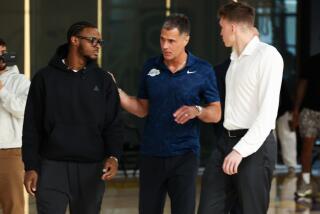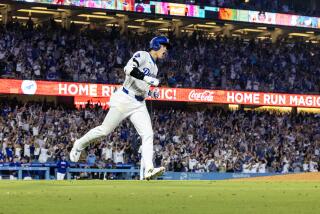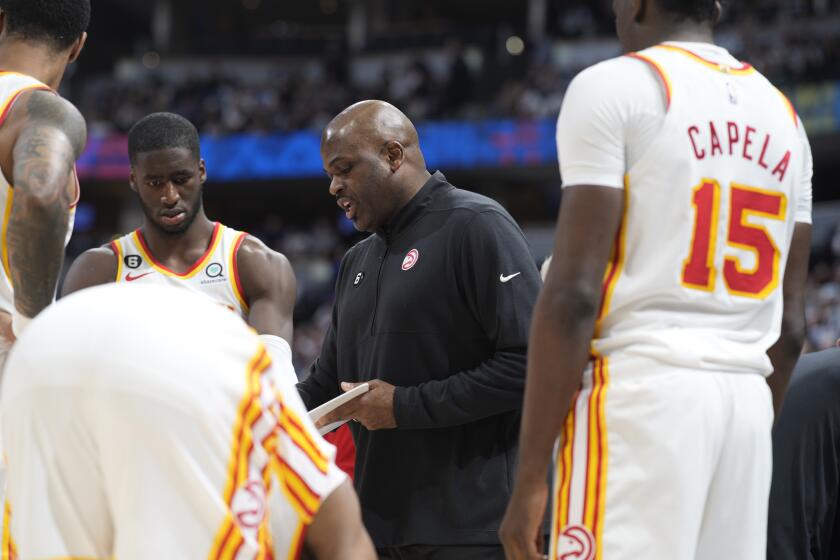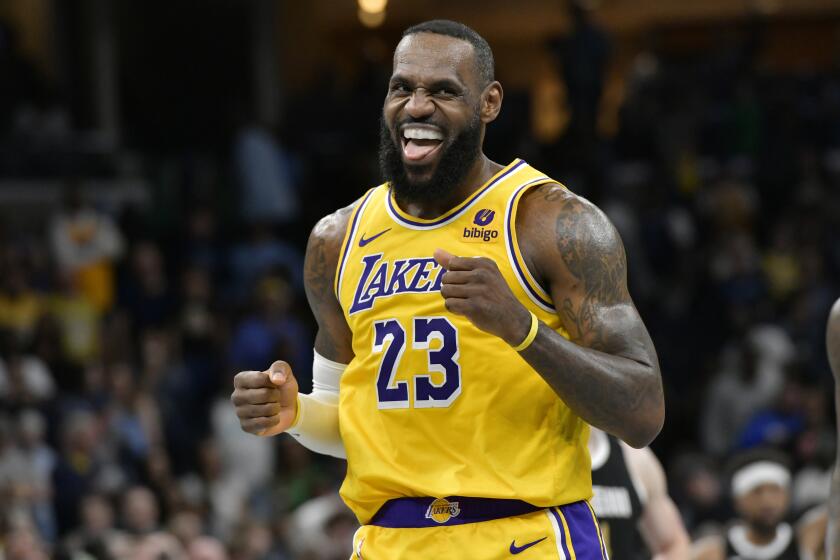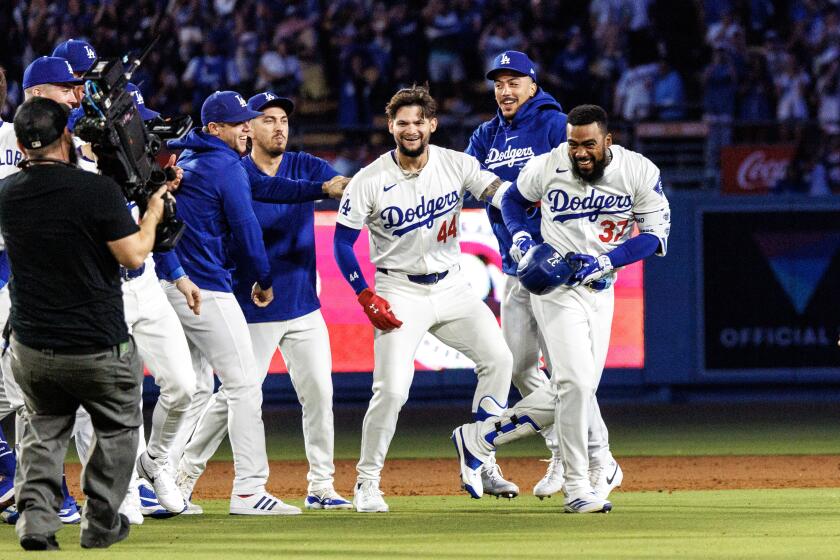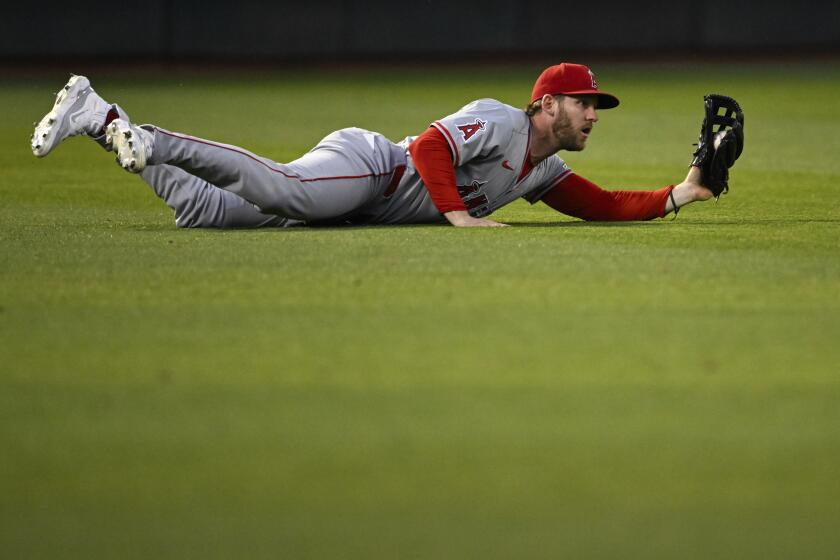Game (not) over
They are the Dodgers’ two fallen heroes, the one with the goggles and the one with the dreadlocks.
They are the two players who have electrified Dodger Stadium in the two decades without a World Series. The one with the goggles has not pitched for the home team in three years, the longing for his showtime, and for a more innocent time, evident in his voice.
Game Over is long over. Long live Mannywood.
“I hear it’s pretty cool,” Eric Gagne said, “with Manny.”
On the day Manny Ramirez would make his comeback before tens of thousands of adoring fans -- in enemy territory, no less -- Gagne sat at a table for two at a riverfront cafe, in this weathered city more than 400 years old, and more than 400 miles from the nearest big league outpost.
He wore a black Ed Hardy T-shirt. He ate his poutine -- the Quebec delicacy of fries topped with gravy and cheese -- in peace. No one asked him for an autograph.
This is a long way to go to get away from the Mitchell Report and start over.
This is home. These are the people who nurtured him, who dropped coins into a bucket to help pay his way to college, who packed the stadium here and gave him a standing ovation just for coming home to pitch, for the Quebec Capitales of the independent Can-Am League.
L.A. was home too, once upon a time. We wore goggles and goatees, sweat-stained caps and “Game Over” shirts. We went nuts for the record-setting 84 consecutive saves and for the Cy Young Award, for “Welcome to the Jungle” and for the best show in town.
“The electricity was unreal,” Gagne said. “I never thought that was possible in baseball.
“Those were the best days of my life. I think about them every day.”
Those were some of the best days of our baseball lives too, memories now tarnished by the Mitchell Report. In 2004, according to the report, Gagne received multiple shipments of human growth hormone, one sent directly to the clubhouse at Dodger Stadium.
“I’m not denying it,” he said. “I’m not saying I did it. I just can’t talk about it.
“It’s a touchy subject. It doesn’t just involve me.”
He won’t say why, but it’s not hard to guess. If he says he did indeed obtain HGH, the next question would be how. The answer in the Mitchell Report: through his old friend and teammate, Paul Lo Duca.
He also won’t comment about the Boston Red Sox scout whose e-mail evaluation of Gagne is included in the report, highlighted by these words: “Steroids is the issue.”
Gagne points no fingers. He offers an apology to his fans, even if he declines to say exactly why.
He does not talk, as Alex Rodriguez did, about the “loosey-goosey” culture in the era before baseball started drug tests.
“I don’t think it was a culture,” Gagne said. “Everybody makes their own decision and lives with it. We’re all grown-ups.”
And he does not blithely make light of the issue, as Ramirez has done in the wake of his 50-game suspension for violating baseball’s drug policy. Ramirez has riffed that he was neither a murderer nor a rapist, and on Friday he invoked Jesus Christ in an awkward effort to equate embarrassment with persecution.
No, this hit Gagne hard. The details might be sparse, but the remorse is genuine.
“I’ve been straightforward about everything. It [stinks] that I can’t be about this,” he said. “I’m not looking for sympathy anyway.
“I have to live with this the rest of my life. I’m going to have to explain this to my kids. It’s going to be on my resume the rest of my life.”
He volunteers that he is a role model for kids -- and not just his four kids, none older than 8. He is a model for what not to do, whatever that might have been.
“I hope I serve as an example,” Gagne said. “You don’t want to be in my shoes.
“This is hell. I’ve still got to talk about it.”
His three best seasons, the ones in which he recorded the 84 consecutive saves, were the last three before baseball instituted a drug policy and initiated mandatory suspensions for first offenders.
Did Dodgers fans -- the ones that paid good money for tickets and “Game Over” memorabilia -- get an honest performance in return?
“To me, yes,” Gagne said. “I can guarantee I worked harder than anybody.
“I still do, except I eat a lot more poutine now.”
He can do that daily here, on the cobblestone streets within the walls of Old Quebec, or within the walls of the charming old ballpark he now calls home.
Hank Aaron hit a home run here. Tom Lasorda and Sparky Anderson and Warren Spahn played here, half a century ago.
The Stade Municipal opened in 1939. Gagne furnished the cramped clubhouse with a bit of 2009, with a flat-screen television that looks jarringly out of place among the wooden benches and stalls.
He works with the other pitchers. He alerts the hitters to how an opposing pitcher might be tipping his pitches. He sits on a rickety bus, for a 10-hour ride.
“His whole attitude is absolutely unbelievable,” Quebec Manager Michel Laplante said.
Gagne is a hero here, living history in a place to which sports history has not been kind. The local sporting goods stores display in their windows the jerseys of the Quebec Nordiques, the NHL team that moved to Denver 14 years ago, and the Montreal Expos, the major league team that moved to Washington five years ago.
Hockey will reign forever in Quebec. Alas, baseball is dying among the youth here.
Gagne grew up rooting for the Expos, dreaming of baseball. The Expos are no more, but perhaps the dreams can live again, among one or two or three of the kids in the standing-room-only crowds that gather when Gagne pitches.
“He might be the one to revive baseball in Quebec,” said Pierre-Luc Nappert, the Capitales’ director of media relations. “He has the power to do it.”
Gagne is in Quebec to revive his career. He is trying to work his way back from a partially torn rotator cuff, with four appearances so far and a fastball Laplante put at 84-87 mph. He should get stronger, and presumably better, and if so he could get a minor league contract in August, or a spring training invitation next year.
He is in baseball limbo here, not because of the Mitchell Report, but because of his shoulder. What was once a national outrage over baseball’s steroid era has evolved into a national fatigue.
If Ramirez hits, Dodgers fans cheer.
“Everybody makes mistakes,” Gagne said. “You keep going. You do what you do. What Manny does best is hit balls. Manny is an entertainer. That’s not just in L.A. It’s anywhere. If you’re a fan . . . you want to see something special.”
There was no better entertainer in L.A. than Gagne, back in the day.
“That’s why I keep going to the ballpark,” he said. “I’m searching for that again.”
Gagne relives it every day. His 5-year-old son scampers about in a Dodgers cap. His 3-year-old daughter is named Bluu -- yes, he said, for Dodger blue. If his fastball comes back, perhaps he could too. He has committed no sin that would prevent him from another stint in L.A. All the fans here Saturday could see that. They flocked to Stade Municipal once again, but Gagne’s start was rained out. They waited out the rain delay beneath the stands, in a concourse where the television showed Ramirez, the one with the dreadlocks, at-bat in Dodger blue.
--
More to Read
Get our high school sports newsletter
Prep Rally is devoted to the SoCal high school sports experience, bringing you scores, stories and a behind-the-scenes look at what makes prep sports so popular.
You may occasionally receive promotional content from the Los Angeles Times.

